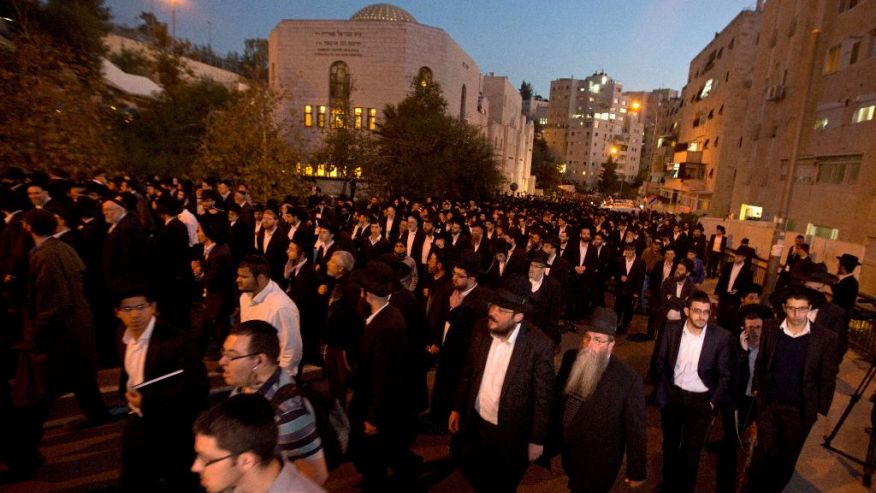
Worshippers returned today to the synagogue in Jerusalem where five people were killed Tuesday, joining in prayerful solidarity despite the chaos surrounding them.
The synagogue, located in the west Jerusalem neighborhood of Har Nof, was still covered by blood-splattered books and prayer shawls as Jewish and Christian worshippers knelt in prayer. A little more than 24 hours earlier, two Palestinian cousins - armed with meat cleavers, knives and a handgun - stormed a synagogue and left a death toll that included three Israeli-American rabbi, a British-Israeli rabbi and an Israeli policeman. The attackers were immediately shot and killed by Israeli police.
"It's a little scary, but we're going to have to go on with our lives. We're staying here, we're not moving anywhere ... this terrorist attack is not going to change anything," said Avraham Burkei, a member of the synagogue in Jewish West Jerusalem.
"The attack shows that our future in this world is dependent on God," said another worshipper named Gavriel Cohen.
In recent weeks, a total of 11 people have died at the hands of Palestinian attackers -- most in Jerusalem but also in Tel Aviv and the West Bank.
In response to Tuesday's attacks, Israeli officials immediately took steps to prevent more violence.
Prime Minister Benjamin Netanyahu,who publicly blamed Palestinian leaders for inciting violence, said he had ordered security forces to hit back hard at Palestinians involved in violence against Israelis, and to resume the policy of home demolitions.
Without wasting any time, Israeli security forces destroyed the home of a Palestinian man involved in the October attack on Jerusalem's light rail system that killed a 3-month-old baby girl and a 22-year-old woman. The attacker, Abdel Rahman al-Shaludi, was shot dead by police.
Meanwhile, Israel's Public Security Minister, Yitzhak Aharonovitch announced he would "ease restrictions" on Israelis carrying guns for self-defense, and said the rule change could affect anyone with a gun license.
Israel's Economy Minister Naftali Bennett also called on the government to launch a military operation "go to the source" of terror in the holy city.
"We need to move from defence to attack, like we did in Operation Defensive shield," Bennett told Israel's Army Radio, citing the name for the military campaign waged during the second Palestinian intifada, or uprising, more than a decade ago.
"Go in with Border Police forces, make arrests, create intelligence channels, stay there on a permanent basis, not just when there's a terror attack," he added.
At the Vatican, Pope Francis condemned the synagogue slayings and urged both sides to end the "spiral of hatred and violence and take courageous decisions for reconciliation and peace."
"To build peace is difficult," Francis said, "but to live without peace is a torment.
But despite diplomatic efforts, Israeli citizens fear the violence is far from over:
"It's gone from bad to worse - it's never been this bad," Uday Abu Sbeitan, a 65-year-old Palestinian, told Reuters.
"Women are scared for their children at night - that they might be arrested or kidnapped."
"We have no security in this neighborhood, and the situation has been tense in Jerusalem for a long time," added Mirit Sandori, who said she works with Palestinians from East Jerusalem in the supermarket. "Lately, they have been looking at us with cold eyes, eyes of hate."















